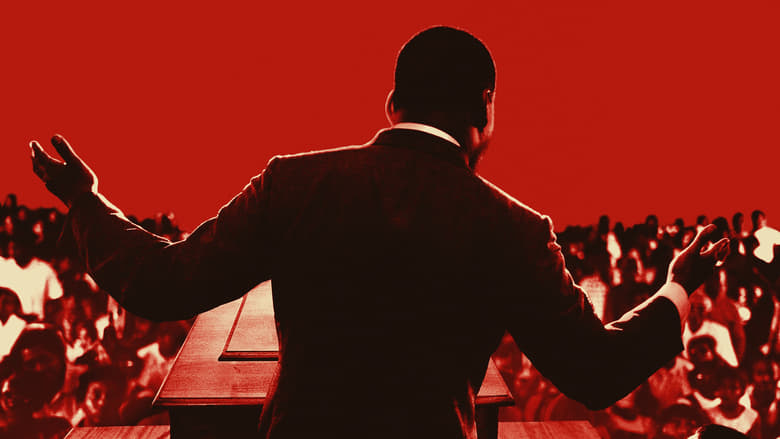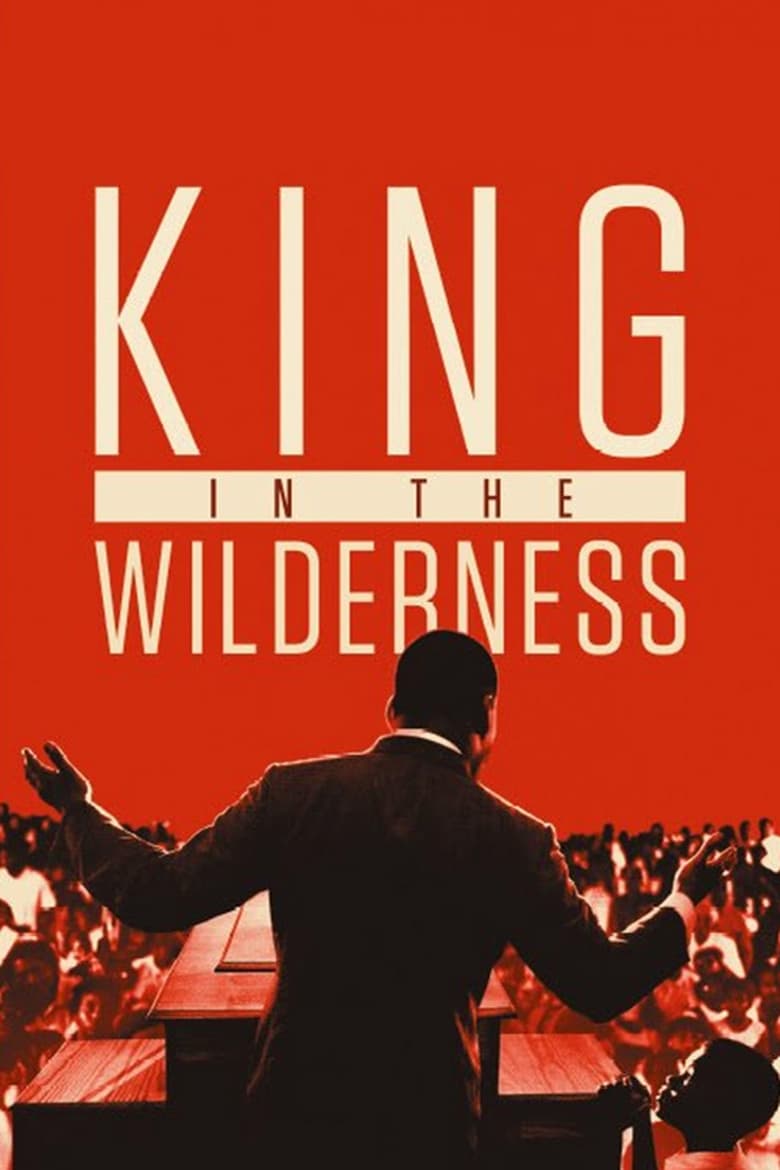

King in the Wilderness
When his dream for American became a nightmare
Genres
Overview
A chronicle of the final chapters of Dr. Martin Luther King Jr.’s life, revealing a conflicted leader who faced an onslaught of criticism from both sides of the political spectrum.
Details
Budget
$0
Revenue
$0
Runtime
111 min
Release Date
2018-01-22
Status
Released
Original Language
English
Vote Count
21
Vote Average
6.9
Martin Luther King Jr.
Self (archive footage)
Joan Baez
Self
Harry Belafonte
Self
Clarence Jones
Self
Bernard LaFayette Jr.
Self
Andrew Young
Self
C.T. Vivian
Self
John Lewis
Self
Cleveland Sellars
Self
Joseph Califano
Self
Diane Nash
Self
Dorothy Cotton
Self
Mary Lou
Self
Henry Mitchell
Self (archive footage)
Jessie Jackson
Self
James Meredith
Self
Kwame Ture
Self (archive footage)
Coretta Scott King
Self (archive footage)
Arnold Michaels
Self
Robert F. Kennedy
Self (archive footage)
Marian Wright Edelman
Self
Clifford Alexander
Self
9.0
Rogues In Robes
A clinical review of judicial corruption, the good and the bad guys showcased. The need for complete, federal and state judicial reform, term limits, with no immunities.
2016-05-04 | en
0.0
Martin Luther King by Trevor Mcdonald
On the anniversary of Martin Luther King's death, Sir Trevor McDonald travels to the Deep South of America to get closer to the man who meant so much to him.
2018-03-22 | en
8.0
Lynching Postcards: Token of a Great Day
This chilling reflection examines the horrific history of lynchings as cultural events and celebrations that included souvenirs and postcards.
2021-10-01 | en
7.0
The Jazz Ambassadors
The Cold War and Civil Rights collide in this remarkable story of music, diplomacy and race. Beginning in 1955, when America asked its greatest jazz artists to travel the world as cultural ambassadors, Louis Armstrong, Dizzy Gillespie, Duke Ellington and their mixed-race band members, faced a painful dilemma: how could they represent a country that still practiced Jim Crow segregation?
2018-05-04 | en
0.0
Fannie Lou Hamer’s America
The film explores and celebrates the lesser-known life of a Mississippi sharecropper-turned-human-rights-activist and one of the Civil Rights Movement’s greatest leaders. Throughout the 1960s, Fannie Lou Hamer established a legacy of civil rights and human rights activism that remains relevant to this day – especially among Black youth.
2022-02-22 | en
6.9
Freedom on My Mind
Chronicles the Mississippi voter registration drive from 1961-1964.
1994-06-22 | en
8.0
Martin Luther King, Jr. : Marked Man
National Geographic documentary on Martin Luther King Jr. helps drive change in the United States in the face of bitter opposition, not least from opponents within the U.S. government; King is subjected to a fierce campaign of intimidation by J. Edgar Hoover's FBI.
2018-04-04 | en
7.0
Cannabis : Une enquête de Mathieu Kassovitz et Antoine Robin
2024-04-02 | fr
4.2
Screaming Queens: The Riot at Compton's Cafeteria
The first major uprising against police brutality, harassment, and societal oppression was not at Stonewall in 1969, but at Compton's Cafeteria in San Francisco three years earlier. Those who stood up were trans women and gay men. Now, nearly 40 years on, Susan Stryker and Victor Silverman tell the story of this oft-overlooked event in the history of American civil rights.
2005-06-18 | en
7.7
Integration Report 1
Integration Report 1, Madeline Anderson's trailblazing debut, was the first known documentary by an African American female director. With tenacity, empathy and skill, Anderson assembles a vital record of desegregation efforts around the country in 1959 and 1960, featuring footage by documentary legends Albert Maysles and Richard Leacock and early Black cameraman Robert Puello, singing by Maya Angelou, and narration by playwright Loften Mitchell. Anderson fleetly moves from sit-ins in Montgomery, Alabama to a speech by Martin Luther King Jr. in Washington, D.C. to a protest of the unprosecuted death in police custody of an unarmed Black man in Brooklyn, capturing the incredible reach and scope of the civil rights movement, and working with this diverse of footage, as she would later say, “like an artist with a palette using different colors.”
1960-01-01 | en
0.0
The Uncomfortable Truth
When the award-winning filmmaker of "An Ordinary Hero", Loki Mulholland, dives into the 400 year history of institutional racism in America he is confronted with the shocking reality that his family helped start it all from the very beginning.
2018-10-08 | en
7.0
The March
The March, also known as The March to Washington, is a 1964 documentary film by James Blue about the 1963 civil rights March on Washington. It was made for the Motion Picture Service unit of the United States Information Agency for use outside the United States – the 1948 Smith-Mundt Act prevented USIA films from being shown domestically without a special act of Congress. In 1990 Congress authorized these films to be shown in the U.S. twelve years after their initial release. In 2008, the film was selected for preservation in the United States National Film Registry by the Library of Congress as being "culturally, historically, or aesthetically significant". (Wikipedia)
1964-12-31 | en
6.8
Always in Season
When 17-year-old Lennon Lacy is found hanging from a swing set in rural North Carolina in 2014, his mother's search for justice and reconciliation begins while the trauma of more than a century of lynching African Americans bleeds into the present.
2019-01-26 | en
0.0
We The People 2.0
American citizens who are normally marginalized, forgotten and left to fend against toxic dumps and other violations, come to understand that the only way to survive and save their communities is to challenge the system head-on.
2016-06-11 | en
0.0
Get In The Way: The Journey of John Lewis
Biographical documentary about John Lewis, the civil rights icon, respected legislator and elder statesman who continues to practice nonviolence in his determined fight for justice.
2017-06-25 | en
7.2
Two Trains Runnin'
The search of several young, white men for blues singers who have been missing for decades coincides with the Civil Rights Movement in Mississippi in the 1960s.
2016-04-08 | en
7.8
Citizen King
Documentary about the final five, turbulent years in the life of civil rights activist Martin Luther King. The story begins at the Lincoln Memorial in August 1963, when a 34-year-old preacher galvanized millions with his dream for an America free of racism and comes to a bloody end five years later on a motel balcony in Memphis. King has since become a mythic figure, an activist whose works and image are more hotly contested, negotiated and sold than almost anyone else's in American history. (Storyville)
2004-01-01 | en
6.9
Crisis: Behind a Presidential Commitment
During a two-day period before and after the University of Alabama integration crisis, the film uses five camera crews to follow President John F. Kennedy, attorney general Robert F. Kennedy, Alabama governor George Wallace, deputy attorney general Nicholas Katzenbach and the students Vivian Malone and James Hood. As Wallace has promised to personally block the two black students from enrolling in the university, the JFK administration discusses the best way to react to it, without rousing the crowd or making Wallace a martyr for the segregationist cause. Preserved by the Academy Film Archive in partnership with The Film Foundation in 1999.
1963-10-21 | en
5.5
Political Animals
The story of four pioneering lesbian politicians and the battles they fought to pass a wide range of anti-discrimination laws.
2016-06-04 | en
0.0
I Heard It Through the Grapevine
Renowned Black writer James Baldwin retraces his time in the South during the Civil Rights Movement, reflecting with his trademark brilliance and insight on the passage of more than two decades. From Selma and Birmingham and Atlanta; to the battleground beaches of St. Augustine, Florida, with Chinua Achebe; and back north for a visit to Newark with Amiri Baraka, Baldwin lays bare the fiction of progress in post–Civil Rights America, wondering “what happened to the children” and those 'who did not die, but whose lives were smashed on Freedom Road'.
1982-03-03 | en